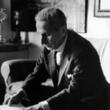There's no turning back: a novel
Description
More Details
Similar Titles From NoveList
Similar Authors From NoveList
Published Reviews
Publisher's Weekly Review
This deeply intelligent 1938 novel from de Céspedes (1911--1997), crisply translated by Goldstein, matches the bravery of the author's The Forbidden Notebook in its groundbreaking portrayal of a group of female friends in Rome. The women, all literature students from different parts of Italy, meet as boarders. As the novel unfolds, the women reckon with important life decisions and face pressure to conform to their patriarchal Catholic society. The oldest, Augusta, warns the others, "Once you're married, you won't be free ever again." Nevertheless, Anna plans to marry and have a child after her studies are completed, while Xenia runs away from school and enters a criminal underworld. The author builds tension as the characters consider the gravity of their choices. As Sylvia, the "genius" member of their group, notes, "It's as if we're on a bridge. We've already departed from one side and haven't yet reached the other.... What awaits us is still enveloped in fog. We don't know what we'll find when the fog clears." Readers will be grateful for this rediscovery. Agent: Johanna Castillo, Writers House. (Feb.)
Publishers Weekly Reviews
This deeply intelligent 1938 novel from de Céspedes (1911–1997), crisply translated by Goldstein, matches the bravery of the author's The Forbidden Notebook in its groundbreaking portrayal of a group of female friends in Rome. The women, all literature students from different parts of Italy, meet as boarders. As the novel unfolds, the women reckon with important life decisions and face pressure to conform to their patriarchal Catholic society. The oldest, Augusta, warns the others, "Once you're married, you won't be free ever again." Nevertheless, Anna plans to marry and have a child after her studies are completed, while Xenia runs away from school and enters a criminal underworld. The author builds tension as the characters consider the gravity of their choices. As Sylvia, the "genius" member of their group, notes, "It's as if we're on a bridge. We've already departed from one side and haven't yet reached the other.... What awaits us is still enveloped in fog. We don't know what we'll find when the fog clears." Readers will be grateful for this rediscovery. Agent: Johanna Castillo, Writers House. (Feb.)
Copyright 2024 Publishers Weekly.





























